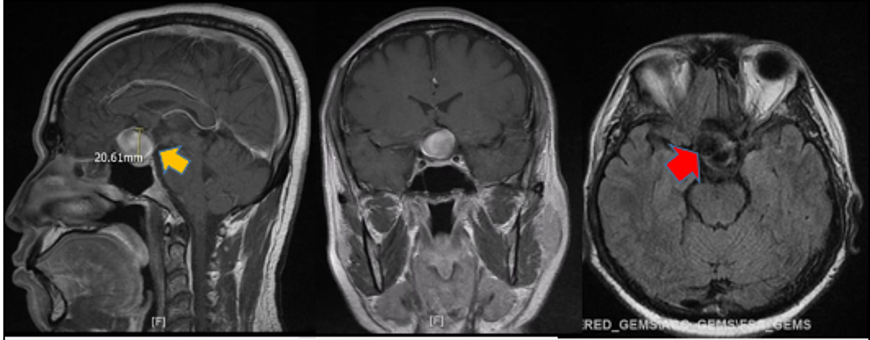Giant Intracranial Aneurysm Presenting as Temporal Hemianopia: When the Eyes Reveal a Hidden Danger
DOI:
https://doi.org/10.35749/journal.v51i2.101687Keywords:
Intracranial aneurysm, optic chiasm compression, temporal hemianopiaAbstract
Introduction: Giant intracranial aneurysms (GIA) are rare and deadly diseases due to the high risk of rupture. The purpose of this report is to describe a case of GIA presenting as temporal hemianopia.
Case Report: A 52-year-old male presented with worsening blurry vision three weeks before admission. Visual acuity was light perception in the right eye and 6/18 in the left eye. Neuro-ophthalmic examination revealed a relative afferent pupillary defect in the right eye and bilateral optic atrophy. At the next visit, the visual acuity of the right eye recovered to 6/18. Visual field testing showed temporal hemianopia in the left eye and generalized depression in the right eye. Magnetic resonance imaging demonstrated a 0,4 cm x 2,5 cm x 1,9 cm saccular aneurysm, on the medial side of the left internal carotid artery (ICA).
Discussion: A giant (diameter ≥2.5 cm) ICA aneurysm may compress the optic chiasm, leading to various stages of visual loss. Several factors are known to delicate balance between thrombogenesis and thrombolysis within the aneurysmal sac. Spontaneous intra-saccular thrombosis in an unruptured GIA may be induced by calcification within the atherosclerotic wall of the aneurysm and loss of elastic lamina. It is prone to occur in a narrow aneurysm neck (<0.4 cm). Thrombosis reduces the size of the aneurysm sac, in which the accumulated fluid is reabsorbed. This may explain the decompression effect on optic chiasm and spontaneous visual recovery.
Conclusion: Intracranial aneurysms are a rare cause of optic chiasm compression but can still be considered in cases of temporal hemianopia.
Downloads
References
Badea R, Olaru O, Ribigan A, Ciobotaru A, Dorobat B. Unruptured Giant Intracerebral Aneurysms: Serious Trouble Requiring Serious Treatment - Case Report and Literature Review. Maedica (Bucur). 2019;14(4):422-427.
de Aguiar GB, Pagotto MV, Conti ML,Veiga JC. Spontaneous thrombosis of giant intracranial aneurysm and posterior cerebral artery followed by also spontaneous recanalization. Surg Neurol Int 2016;7:15.
Ghassani A, Sani AF, Kurniawan D. A rare case report of spontaneous thrombosis in unruptured giant intracranial aneurysm. Radiol Case Rep. 2023;18(8):2649-2652. Published 2023 May 29. doi:10.1016/j.radcr.2023.05.005
Balaji A, Rajagopal N, Yamada Y, Teranishi T, Kawase T, Kato Y. A Retrospective Study in Microsurgical Procedures of Large and Giant Intracranial Aneurysms: An Outcome Analysis. World Neurosurg X. 2019;2:100007. Published 2019 Jan 9. doi:10.1016/j.wnsx.2019.100007
Baek, Shin-Hye & Shin, Dong-Ick & Ahn, Mi-young & Kang, Jin-Hwi & Shin, Jeawon & Lee, Hyung-Suk & Lee, Mou & Lee, Sung-Hyun & Lee, Sang-Soo. (2011). Large Aneurysm of the Internal Carotid Artery Presenting as Bitemporal Hemianopia. Korean Journal of Stroke. 13. 152. 10.5853/kjs.2011.13.3.152.
Abrishami M, Baharvahdat H, Hosseini S, Ganjeifar B. Endovascular treatment of an unruptured anterior communicating artery aneurysm presenting with acute altitudinal visual field defect: A case report. J Curr Ophthalmol. 2017;30(2):177-181. Published 2017 Nov 7. doi:10.1016/j.joco.2017.10.001
Fukiyama Y, Oku H, Hashimoto Y, et al. Complete Recovery from Blindness in Case of Compressive Optic Neuropathy due to Unruptured Anterior Cerebral Artery Aneurysm. Case Rep Ophthalmol. 2017;8(1):157-162. Published 2017 Mar 7. doi:10.1159/000458753
Choi CY, Han SR, Yee GT, Lee CH. Spontaneous regression of an unruptured and non-giant intracranial aneurysm. J Korean Neurosurg Soc. 2012 Sep;52(3):243-5.
Cohen JE, Rajz G, Umansky F, Spektor S. Thrombosis and recanalization of symptomatic nongiant saccular aneurysm. Neurol Res. 2003;25:857–9.
Santoro A, Armocida D, Paglia F, et al. Treatment of giant intracranial aneurysms: long-term outcomes in surgical versus endovascular management. Neurosurg Rev. 2022;45(6):3759-3770. doi:10.1007/s10143-022-01884-3

Downloads
Published
Issue
Section
Categories
License
Copyright (c) 2025 Annisa Nindiana Pertiwi, Syntia Nusanti, Marsha Rayfa Pintary, Salmarezka Dewiputri, Sita Paramita Ayuningtyas, Muhammad Sidik

This work is licensed under a Creative Commons Attribution-NonCommercial-ShareAlike 4.0 International License.
